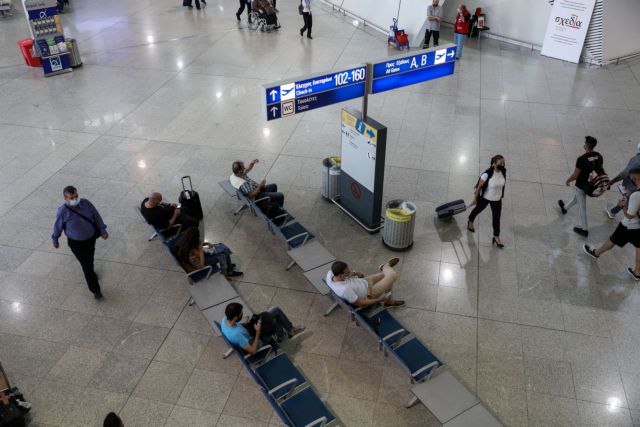
The new NOTAM instructions providing the conditions of entry into Greece to limit the spread of COVID-19 disease, valid from tomorrow Monday 7 February until Monday 21 February 2022, were announced by the Civil Aviation Authority in the context of the new rules European Union on the validity of the European digital COVID certificate and the coordination for safe travel in the EU.
NOTAM provides that travelers do not need to show a negative test result upon their arrival in Greece. This new measure applies for all passengers coming from the Member States of the European Union (EU) and the Schengen Agreement, as well as from the 33 non-EU countries that have joined the European Union Digital Covid Certificate (EUDCC).
International flight instructions provide the following:
Mandatory PLF completion for all passengers: All travelers to Greece, regardless of their nationality, should fill in the electronic PLF form (Passenger Locator Form), at the following electronic address https://travel.gov.gr, any time before the departure of their flight to Greece. The proof of completion of the PLF electronic form, which is automatically sent by e-mail to the passenger by the system, is a necessary travel document.
Travelers having a European Digital COVID Certificate are not obliged to show a negative test result upon their arrival
Entry of travelers from the Member States of the European Union (EU) and the Schengen Agreement, as well as from the 33 non-EU countries that have acceded to the European Union Digital Covid Certificate (EUDCC), i.e. the following countries: San Marino, Albania, Andorra, Armenia, Vatican City, Northern Macedonia, Georgia, Switzerland, El Salvador, United Arab Emirates, United Kingdom, Iceland, Israel, Liechtenstein, Livano, Liva, Monaco, Norway, New Zealand, Ukraine, Uruguay, Panama, Cape Verde, Serbia, Singapore, Thailand, Togo, Turkey, Tunisia, Faroe Islands and Chinese Taipei, is permitted by showing the European Digital COVID Certificate, which contains information about one of the following:
a) Vaccination certificate valid for 9 months after the completion of the basic vaccination and without time limit for travelers who have received the booster dose
b) Certificate of illness lasting up to 180 days
c) Certificate of negative result, which means that travelers should do a PCR within the last 72 hours or alternatively to have been diagnosed negative in a rapid test within 24 hours before their arrival in Greece.
All other travelers should enter Greece by showing a negative test result, regardless of vaccination.
All travelers to Greece, except EU countries and the Schengen Agreement, as well as the 33 non-EU countries that have acceded to the EU digital COVID certification system, including their spouses, or persons with whom they have entered into a cohabitation agreement, and their minor children, regardless of vaccination, must have a negative PCR test, done within the last 72 hours, or alternatively must have been diagnosed negative in a rapid test within 24 hours before their arrival in Greece.
Checks on children from 5 years and over
The obligation of conditions to enter Greece applies for children from five (5) years and over.
Sampling of travelers and a five-day quarantine in case of a positive test: In addition, rapid or PCR tests will be carried out on all international passengers upon arrival, based on the procedure provided by the Passenger Locator Form. In case someone tests positive, he will be placed in a 5-day quarantine at home or in a suitable place of temporary residence indicated by the competent authorities.
After 5 days and if there are no symptoms, or the symptoms have improved, with fever having subsided without the use of antipyretics, the temporary restriction expires. If the fever persists after 5 days, the temporary restriction is extended until the fever completely subsides. These passengers are required to wear only high respiratory protection masks (FFP2 or N95) or, alternatively, double mask (surgical and fabric) for at least another 5 days from the end of the restriction. All foreign passengers must faithfully follow the instructions of the health authorities of Greece.
The use of a mask is mandatory
At arrivals and departures within airports, as well as during air flights, staff and passengers are required to wear a protective masks. Passengers are also required to comply with the instructions of the permanent and temporary staff of airports or airlines, who are in charge of the duties of supervision, crowd management and assistance to passengers, in order to maintain the necessary distances, to avoid overcrowding and to ensure the best way to embarkate or disembarkate from the airplanes.
The control of the above documents is carried out by the employees of the airlines and by the police authorities. The airlines are obliged to check the traveler before boarding, in order to confirm that they have the necessary documents, and in case of violation, they have the obligation to repatriate the passenger at their own risk and expense.
Latest News

German Ambassador to Greece Talks Ukraine, Rise of Far Right & Tariffs at Delphi Economic Forum X
Commenting on the political developments in his country, the German Ambassador stressed that it was clear the rapid formation of a new government was imperative, as the expectations across Europe showed.

Athens to Return Confiscated License Plates Ahead of Easter Holiday
Cases involving court orders will also be excluded from this measure.

Servicers: How More Properties Could Enter the Greek Market
Buying or renting a home is out of reach for many in Greece. Servicers propose faster processes and incentives to boost property supply and ease the housing crisis.

Greek Easter 2025: Price Hikes on Lamb, Eggs & Sweets
According to the Greek Consumers’ Institute, hosting an Easter dinner for eight now costs approximately €361.95 — an increase of €11 compared to 2024.

FM Gerapetritis Calls for Unified EU Response to Global Crises at EU Council
"Europe is navigating through unprecedented crises — wars, humanitarian disasters, climate emergencies," he stated.

Holy Week Store Hours in Greece
Retail stores across Greece are now operating on extended holiday hours for Holy Week, following their Sunday opening on April 13. The move aims to accommodate consumers ahead of Easter, but merchants remain cautious amid sluggish market activity.

Green Getaway Ideas for Easter 2025 in Greece
Celebrate Easter 2025 in Greece the sustainable way with eco-farms, car-free islands, and family-friendly getaways rooted in nature and tradition.

Civil Protection Minister Details Summer Firefighting Plans at Delphi Forum
At the 10th Delphi Economic Forum, Minister of Climate Crisis and Civil Protection Yiannis Kefalogiannis discussed Greece's plans for the upcoming fire season.

How Shops and Markets Will Operate During Easter Holy Week
The Easter holiday schedule has been in effect since April 10, with retail stores open Palm Sunday, and most supermarkets also operating to meet consumer demand for Easter shopping

Why Is the French Aircraft Carrier Charles De Gaulle in Piraeus?
Docking in Piraeus after a four-month deployment in the Indo-Pacific region, the admiral of the aircraft carrier the Charles de Gaulle says, "Greece is our best partner in the Mediterranean."








































 Αριθμός Πιστοποίησης
Αριθμός Πιστοποίησης